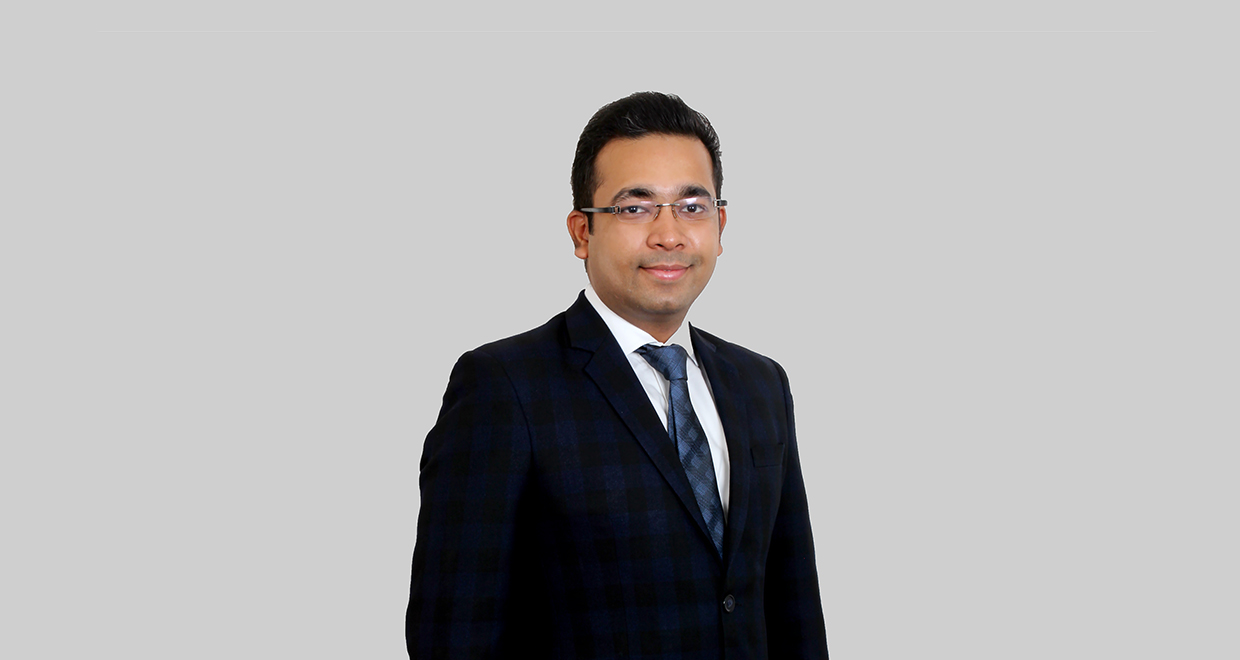Divyam Agarwal graduated from Amity Law School in 2007 and went on to do a Master’s from The London School of Economics and Political Science (LSE) in 2008. Today, he is a Senior Associate at J. Sagar Associates and has extensive experience in Commercial & Civil Litigation matters as well as commercial arbitrations.
A qualified Advocate-on-Record of the Supreme Court of India, in this interview Divyam shares with us:
- The importance of learning the art of advocacy in law school through moot courts
- His take on how to apply for Master’s at the prestigious LSE
- Experience of working at a Tier-I law firm
- The method of preparing for the difficult AOR Exam
Please share with us how you chose to study law. Do you have lawyers in your family?
While growing up, I had no specific inclination towards taking up law as a profession. With the passage of time and after closely observing my maternal grandfather who was a reputed taxation lawyer in UP as well as my father who is a chartered accountant, I realized that a person having knowledge of law thinks rationally and objectively in not only professional situations but also in day to day affairs of life. Though I was initially hesitant, after joining my law course, I developed a keen interest in law subjects, particularly those pertaining to dispute resolution. One thing led to another and I found my calling.
How was your experience at Amity Law School?
Studying at Amity Law School was a great experience. Apart from the regular course structure, we were given ample opportunities to participate in several moot court competitions and other such events. Another advantage of studying at Amity Law School was the fact that the college was based in Delhi and I got several opportunities to intern with practicing lawyers and well-known law firms.
Could you tell us about the internships you undertook during this period? How do you believe one should structure their internships during law school to provide the maximum exposure?
My internships were spread out evenly in the corporate sector as well as litigation. Even though my interest all along had been to pursue dispute resolution, in order to make a reasoned and well informed decision, I decided to intern in a corporate setup, so as to assess work involved therein and my inclination towards the same.
It is advisable to evenly spread internships and gain exposure in maximum possible areas of law. This helps in identifying the right practice area. Another way for maximizing the benefits of internships is to link the internships with the nature of subjects which one is being taught concurrently in college.
You were an avid mooter in law school. Please share with us your achievements and experiences in mooting.
All law students must hone their oratory skills by regularly participating in moot court competitions. I represented my law school in many competitions and was fortunate to win several accolades. I was part of the team that won the national rounds of Stetson International Environment Law Moot and we represented India at the World Rounds held at Florida, USA. At the World Rounds, our team made it to the quarter finals and I was declared the third best oralist. My love for mooting continued even during my stint at LSE. I was part of the team that represented LSE at Willem C. Vis Moot held at Vienna. Mooting not only aided me in overcoming any possible unease in presenting my thoughts in an effective manner but also improved my inter-personal skills and confidence.
What was your motivation to go abroad for higher studies? How should one go about applying for premier foreign universities like LSE?
(Divyam pursued a Master’s from the prestigious LSE)
Although it is a common perception that lawyers intending to practice in the dispute resolution sphere do not necessarily require higher qualification than LLB degrees and higher qualification is often considered to be a means for personal gratification, I have always been of the view that to truly understand the ethos and ever evolving dynamics of any subject, law or any other, it is imperative that one should refine their knowledge by pursuing higher education in their chosen field.
LSE being one of the premier institutes was a logical choice. I was really impressed with the quality of the faculty for my area of interest. Also, from my research I noted that at LSE the emphasis during classes was on discussions and deliberations regarding practical application of theoretical concepts. This difference in approach was one of the key factors which made me opt for LSE. On a lighter note, the fact that I had been awarded the K.R. Narayanan Scholarship for my Master’s course at LSE made the decision a no brainer!
Applications at LSE are considered strictly on academic merit. It is imperative to have a good aggregate coupled with mooting and internship experience. Aspirants should concentrate on preparing a focused Statement of Purpose and also obtain Letters of Recommendation from legal luminaries and academicians whom they have been associated with.
How did you zero in on Arbitration as your specialization for your Master’s?
Arbitration as an alternate dispute resolution mechanism has always fascinated me. In my law school days, courts were shaping the arbitration law at an alarming pace. Substantial advances had been made in foreign jurisdictions especially in the United Kingdom and the principles of alternate dispute resolution and arbitration were well established there. As such, when it came to my Master’s degree, understanding the nuances of international commercial arbitration was a natural choice.
How was the experience at LSE? How do you think it has helped you?
As clichéd it may sound, at LSE I had the best experience of my life. The whole spirit of LSE –taught by brilliant minds, sharing space with exceptional students from around the world and the overall vibe of the city– was really an enriching experience.
I found my time at LSE to be both inspirational and essential formy future career. It has given me a broad understanding of the world from a legal perspective which I have found relevant to everything from work in the office to chats in the pub.
Students wishing to pursue Master’s should prefer a chance abroad or in India?
I believe every law student, given the opportunity, must go for Master’s abroad. The transnational exposure and interaction with lawyers/law students from other jurisdictions helps one in gaining invaluable experiences. It is definitely worth pursuing Master’s from abroad. It changes you in the way you think about everything around you.
How did you proceed after your Master’s?
In my final year of law school I had interned at J. Sagar Associates. During my internship, I was fortunate to receive a placement offer from the Dispute Resolution team. After the completion of my Master’s, I approached the firm and was given an opportunity to work with them. That’s how my journey with JSA began.
How has the experience of working for the Dispute Resolution Team of a Tier I law firm been?
(Divyam is currently a Senior Associate at J. Sagar Associates)
Working at JSA has been an enriching experience. I have recently completed 7 years with the firm, yet each day I continue to learn something new. Each day possesses a different challenge and I look forward to the same. Initially, it was challenging to match the high standards of the organization. However, over the years I have been able to fit myself in and now I strive towards achieving JSA’s vision and mission.
In a profession known to take its toll on one’s personal life, how do you manage to find time for yourself?
Dispute Resolution is one of the most demanding practice areas. My day is a mix of court appearances, drafting, research work, client meetings and briefing senior counsels. The key lies in effective time management. One trick I have learnt and have followed over the years is to monitor my sleep cycle and squeeze some time either late in night or early morning and finish some chores at home. This allows me greater flexibility throughout the day and a window for attending to my family life. As Thomas Edison once said and I quote “Most people overeat 100 percent and oversleep 100 percent, because they like it. That extra 100 percent makes them unhealthy and inefficient”.
Do Indian law firms value an LL.M. from abroad? Does the lack of an NLU tag hurt one’s chances?
I feel in India you don’t get enough recognition or weightage for having obtained higher qualification. However, of late the trend has started to shift towards recognizing such higher qualifications, which bodes well for future aspirants who wish to pursue LL.M. from abroad.
In so far as the lack of an NLU tag is concerned, I have not experienced any such discrimination. Unlike some firms around, JSA has a very open and acceptable culture towards other law schools. Here it is all about merit. You don’t get any extra stars for carrying an NLU chip on your shoulder.
What suggestions would you have for aspirants looking at clearing the notoriously difficult AOR exam of the Supreme Court of India?
(Divyam recently cleared the AOR exam and got the 4th rank)
Be aware of the current legal position. There are so many legal initiatives which regularly notify us with new developments. Questions are often inspired by recent developments in law. Also it would be helpful to have practical exposure. Take time out and visit the Registry and Listing Branches of the Supreme Court with your office clerk and witness how court filings are actually done. This will really help you in understanding and appreciating the procedural aspect. And of course do not miss the lectures which are organized by Supreme Court Registry and Supreme Court Bar Association. They are very helpful.
It is being debated whether there actually is a need of the AOR system in the Apex Court. What are your views on the necessity of the AOR system in the Supreme Court?
AORs play a vital and constructive role in the justice delivery system. The court system being pyramidal in structure makes the Supreme Court as the Court of last resort, so it is imperative to have effective representation by an Advocate, who is trained and well equipped to deal with the niceties and requirements of the Supreme Court.
Where do you see yourself a decade down the line?
I live by what excites me in life. Presently, I am happy with what I am doing. The work continues to excite me and thus, I believe I see myself growing with the firm.
























